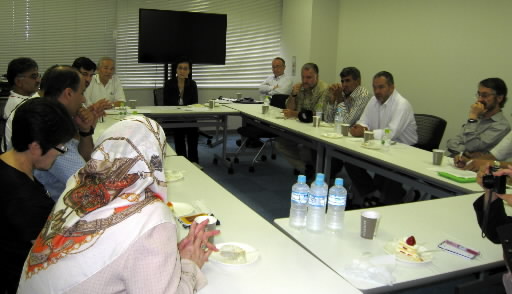Hiroshima NPO “MOCT” lends support to victims of poison gas
Jul. 11, 2013
MOCT, an NPO based in Higashi Ward, Hiroshima, is working to assist poison gas sufferers in Iran. MOCT was born in 1994 after Takafumi Tsuya, a doctor and the husband of the current president of the organization, Shizuko Tsuya, 58, paid a visit to Russia in 1992. The couple then began pursuing medical aid activities, mainly in Russia. In Russian, “moct” means “bridge,” and the name was chosen to symbolize the aim of serving as a bridge to the world.
However, meeting the needs of the Russian people was very difficult, and they experienced a series of setbacks. In the spring of 2004, when they had nearly given up the effort, Ms. Tsuya joined the Hiroshima World Peace Mission, organized by the Hiroshima International Cultural Foundation, and visited a village in Iran that had been hit by poison gas during the Iran-Iraq War.
The victims of poison gas asked her and the other members of the peace mission to spread the fact that poison gas was used in Iran to the world, and MOCT then started working with this community. They also began inviting groups of Iranians to Hiroshima to attend the annual ceremony to observe the August 6 anniversary of the atomic bombing.
Early on, when the poison gas victims came to Hiroshima, they expressed indignation: “The United States supplied the poison gas to Iraq and dropped the atomic bomb on Hiroshima. Let’s stand up to the U.S. together.” However, a week later, just before they left for Iran, they had a change of heart. They came to believe that they should convey the facts of these tragedies without holding a grudge. As a result of their work in Iran, a peace museum was eventually established in the capital, Tehran.
“More than medicines, a remedy is needed for people’s hearts,” Ms. Tsuya said.
MOCT has also been pursuing cultural activities. The organization produced an animated film in 2010 which depicts the life of Marcel Junod, a Swiss doctor who delivered medical supplies to the people of Hiroshima in the aftermath of the atomic bombing. The film, which has won many awards, including a special prize at an international film festival in Serbia in 2012, shows the determined spirit with which Dr. Junod lived his life. (Yuka Ichimura, 17)
(Originally published on July 1, 2013)
However, meeting the needs of the Russian people was very difficult, and they experienced a series of setbacks. In the spring of 2004, when they had nearly given up the effort, Ms. Tsuya joined the Hiroshima World Peace Mission, organized by the Hiroshima International Cultural Foundation, and visited a village in Iran that had been hit by poison gas during the Iran-Iraq War.
The victims of poison gas asked her and the other members of the peace mission to spread the fact that poison gas was used in Iran to the world, and MOCT then started working with this community. They also began inviting groups of Iranians to Hiroshima to attend the annual ceremony to observe the August 6 anniversary of the atomic bombing.
Early on, when the poison gas victims came to Hiroshima, they expressed indignation: “The United States supplied the poison gas to Iraq and dropped the atomic bomb on Hiroshima. Let’s stand up to the U.S. together.” However, a week later, just before they left for Iran, they had a change of heart. They came to believe that they should convey the facts of these tragedies without holding a grudge. As a result of their work in Iran, a peace museum was eventually established in the capital, Tehran.
“More than medicines, a remedy is needed for people’s hearts,” Ms. Tsuya said.
MOCT has also been pursuing cultural activities. The organization produced an animated film in 2010 which depicts the life of Marcel Junod, a Swiss doctor who delivered medical supplies to the people of Hiroshima in the aftermath of the atomic bombing. The film, which has won many awards, including a special prize at an international film festival in Serbia in 2012, shows the determined spirit with which Dr. Junod lived his life. (Yuka Ichimura, 17)
(Originally published on July 1, 2013)







